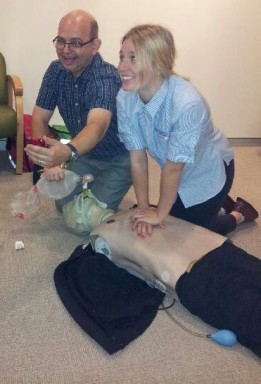Need an Appointment?
If you'd like to book an appointment with the dentist at Seymour Dental then contact us, or call us in Dulwich Hill, Sydney on (02) 9564 2397.
In January this year Roni (our first aid officer) and Dr Seymour with Caitlan (our relief nurse) attended this course run by Cynergex. This course covers topics that are relevant to a dental surgery. These include:
- Cardiac Arrest
- Chest Pain (Acute Myocardial Infarction)
- Chest Pain (Angina Pectoris)
- Loss of Consciousness
- Fitting (Includes Epilepsy, CVA, Drug OD and Hypoxia amongst other causes)
- Hypoglycaemia
- Bronchospasm (Involved in Asthma, Anaphylaxis – all acute wheezing)
- Anaphylaxis
- Medications – Adrenaline Tartrate
- Medications – Aspirin (Acetylsalicylic Acid)
- Medications – Glucodin
- Medications – Nitro-Lingual Spray
- Medications – Ventolin (Salbutamol)
Broadly speaking the main organs we covered were the heart, lungs, brain. Other categories include blood pressure, pulse, blood sugar levels, and oxygen levels and medication interactions.
We practiced again on “George” using a defibrillator and hand compressions. Hard work! Cardiac compressions sole aim is to keep pushing blood around the cardiac arteries to keep the heart muscle electrical activity from disappearing. The defibrillator shocks the heart muscle to increase electrical activity. Crucially, there must be some electrical activity in the heart. A “flat line” of the heart is too late.
The most common event in a dental surgery is fainting. It’s important to lie a person down and not sit them up. A person faints as the blood pressure has fallen that it cannot overcome gravity in getting blood to the brain. Lying down allows the blood to flow to the brain. The air way should be checked. Thankfully most dental work is carried out in a chair that is comfortable and laid back. If you have a tendency to faint, then the dentist will raise you up slowly and allow you sit for a while before standing up. Eat some food before a dental appointment will help you cope better, unless told otherwise, e.g. sedation or in general anaesthetic.
Next week: Roni and medical emergency – Oximeter
 479 Marrickville Road
479 Marrickville Road